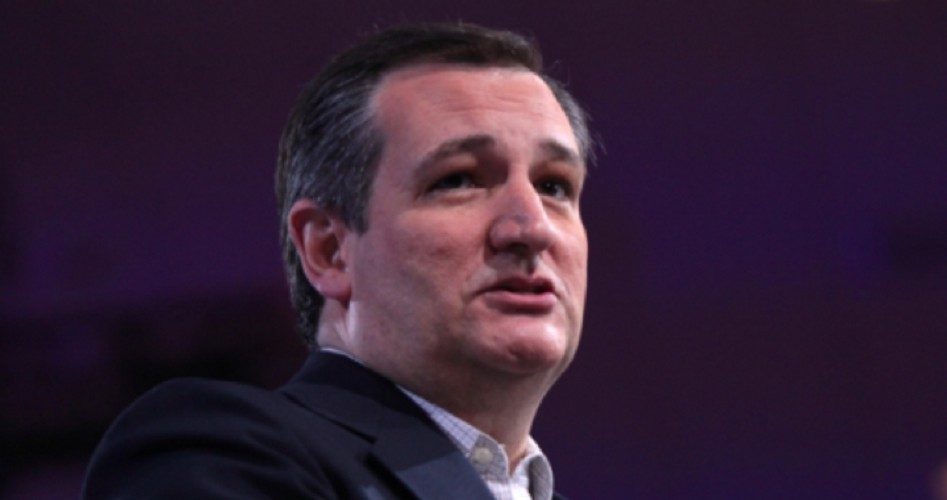
After a bitter and protracted primary fight between Republican presidential nominee Donald Trump and his chief opponent, Senator Ted Cruz of Texas, Cruz (shown) delivered an endorsement of Trump on Friday. And Trump expressed gratitude in return, causing most Republicans to rejoice that the party is beginning to unite against Democratic Party nominee Hillary Clinton.
While Cruz mentioned several reasons that he has opted to endorse Trump, it appears that Trump’s endorsement of Cruz’s fight against the turning over of an important Internet organization to an international body was critical in bringing the two rivals together. After Trump publicly backed Cruz’s position this last week, Cruz reacted by publicly thanking Trump for joining his effort.
The fight is over ICANN (Internet Corporation for Assigned Names and Numbers) and Internet freedom — and though the issue that has not really been addressed by the mainstream media, Cruz tackled it as his first major battle since his presidential campaign ended with Trump’s victory in the Indiana primary. In an effort to stop the transfer of ICANN to an international organization, Cruz has used the negotiations over the budget.
Last Wednesday, Trump joined Cruz in opposition, saying he was “committed to preserving Internet freedom for the American people and citizens all over the world.” To insure this is the case, Trump declared, “The U.S. should not turn control of the Internet over to the United Nations and the international community. President Obama intends to do so on his own authority — just 10 days from now, on October 1st, unless Congress acts quickly to stop him.” He called upon the American people to “help” the congressional Republican opponents of Obama’s efforts.
Trump added,
The U.S. created, developed and expanded the Internet across the globe. U.S. oversight has kept the Internet free and open without government censorship — a fundamental American value rooted in our Constitution’s Free Speech clause. Internet freedom is now at risk with the President’s intent to cede control to international interests, including countries like China and Russia, which have a long track record of trying to impose online censorship. Congress needs to act, or Internet freedom will be lost for good, since there will be no way to make it great again once it is lost.
Only two days after Trump delivered this statement, Cruz endorsed Trump.
In his statement, Cruz recalled that he had urged voters at the Republican National Convention in Cleveland, “Please, don’t stay home in November. Stand, and speak and vote your conscience, vote for candidates up and down the ticket whom you trust to defend our freedom and to be faithful to the Constitution.”
Cruz said that after searching his “own conscience,” he had decided to “vote for the Republican nominee, Donald Trump.”
“Even though I have areas of significant disagreement with our nominee, by any measure Hillary Clinton is wholly unacceptable,” he added.
Cruz listed six key policy decisions with Clinton that “informed” his decision. “First, and most important, the Supreme Court. For anyone concerned about the Bill of Rights — free speech, religious liberty, the Second Amendment — the Court hangs in the balance.”
Cruz then recalled that he had spent his “professional career fighting before the Court to defend the Constitution.” (While Cruz was solicitor general in Texas, he defeated President George W. Bush’s Justice Department before the Supreme Court when Bush attempted to force the state of Texas to accept a UN decree on a death penalty case).
“We are only one justice away from losing our most basic rights, and the next president will appoint as many as four new justices,” Cruz warned. “We know, without a doubt, that every Clinton appointee would be a left-wing ideologue. Trump, in contrast, has promised to appoint justices in the mold of Scalia.”
Cruz said he sought “greater specificity on this issue,” and believes that Trump campaign has now “provided that,” by “making an explicit commitment to nominate only from that list. This commitment matters, and it provides a serious reason for voters to choose to support Trump,”
In addition to the Internet issue and the Trump commitment to nominate constitutionalist judges to the federal bench, Cruz also mentioned that Trump would sign legislation to repeal ObamaCare, and also would “revoke” Obama’s “illegal executive orders” on immigration. Finally, Cruz argued that Trump would be better than Clinton on the important issues of energy and national security.
“If Clinton wins,” Cruz said, “we know — with 100 percent certainty — that she would deliver on her left-wing promises, with devastating results for our country. My conscience tells me that I must do whatever I can to stop that.”
Cruz concluded his remarks by declaring, “Our country is in crisis. Hillary Clinton is manifestly unfit to be president, and her policies would harm millions of Americans. And Donald Trump is the only thing standing in her way.”
Trump responded quickly to Cruz’s endorsement. “I am greatly honored by the endorsement of Senator Cruz. We have fought the battle and he was a tough and brilliant opponent. I look forward to working with him for many years to come in order to make America great again.”
The Cruz endorsement comes just three days before the Monday night debate between Trump and Clinton, and is an indication that the Republican Party is uniting against Clinton, since now only Ohio Governor John Kasich and former Florida Governor Jeb Bush are still refusing to endorse Trump.
Photo: Ted Cruz



